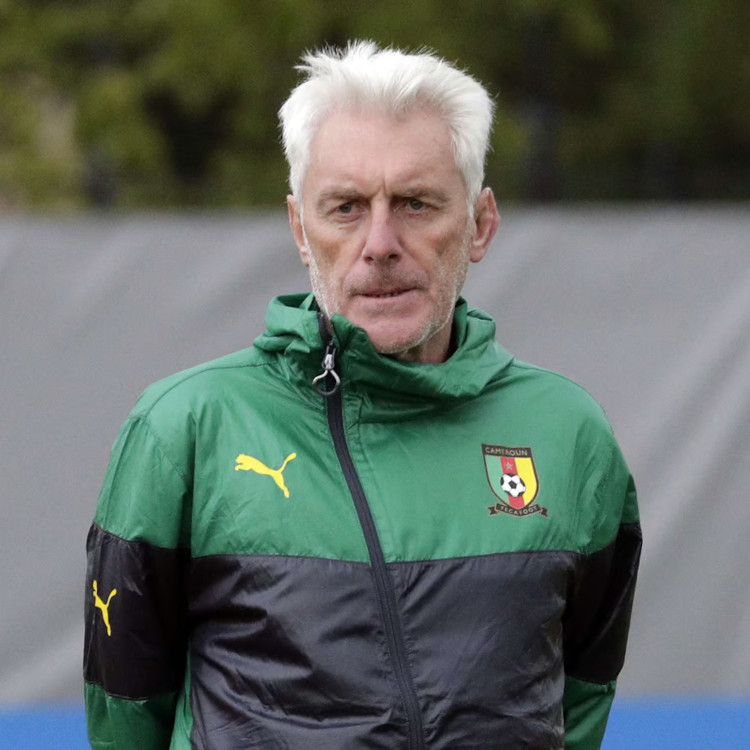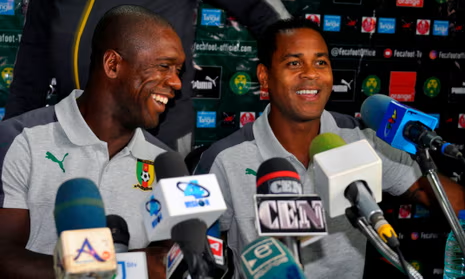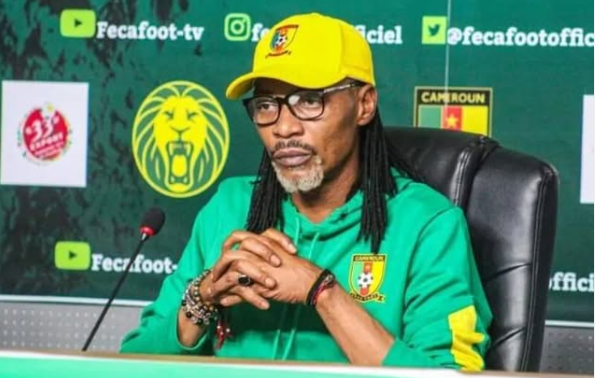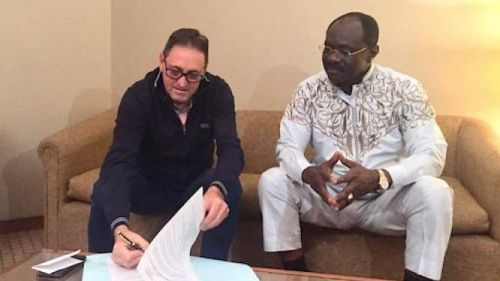The Cameroonian government has agreed to pay Antonio Conceição more than one billion CFA francs to resolve a financial dispute, thereby preventing further consequences for the Cameroon Football Federation (Fecafoot) and the national team, the Indomitable Lions. Fecafoot, the body responsible for interacting with CAF and FIFA, had until February 28, 2025, to settle redundancy payments to the former coach, who was dismissed via Presidential Correspondence N° 232/CF/SG/PR on February 28, 2022. To avoid suspension from FIFA, the Ministry of Sports and Physical Education stepped in to pay the debt, as confirmed in a press release issued on February 21, 2025.
However, the Ministry expressed its disappointment with how Fecafoot handled the situation. « While the responsibility falls on Fecafoot, which has been found at fault for financial mismanagement as mentioned by FIFA, the government of Cameroon has decided to pay the sum of €1.85 million (approximately 1.2 billion CFA francs) to compensate Mr. Antonio Conceição and his assistants, » the Ministry stated. Additionally, compensation measures have been implemented for the national coaches who were part of Conceição’s staff.
FIFA, followed by the Court of Arbitration for Sport (CAS) and the Swiss Federal Tribunal, had ordered Fecafoot to pay €1.85 million (around 1.2 billion CFA francs) to Conceição and his staff. Due to Fecafoot’s inaction, FIFA threatened disciplinary measures, including the suspension of the Indomitable Lions from international competitions. In a letter from December, FIFA reminded Cameroon of the urgency in settling the debt, intensifying pressure on Fecafoot. With the risk of exclusion from FIFA and CAF tournaments, the government ultimately decided to pay off the debt to preserve Cameroon’s international standing and ensure continued participation in global football.
On February 23, 2025, Fecafoot issued a statement distancing itself from responsibility for the payment, emphasizing that Conceição’s contract termination was approved by President Paul Biya. Led by Samuel Eto’o, Fecafoot argued that it was merely executing a government decision and disputed FIFA’s characterization of Fecafoot as the « sole interlocutor of Cameroonian football. »
Fecafoot also pointed out that other previous coaches, including Javier Clemente, Volker Finke, Hugo Broos, and Clarence Seedorf, all appointed by the Ministry, were dismissed under similar circumstances, leading to financial losses for the state. For example, Rigobert Song, appointed by Fecafoot, was released without legal issues due to more favorable negotiations.
This situation raises two key questions: How will Fecafoot ensure future financial independence? And can the government continue to avoid responsibility for poor governance when financial oversight is legally delegated to the Ministry?
Cameroon is one of several African nations where decision-making regarding football is divided between the football federation and the government body, in this case, Fecafoot and the Ministry of Sports and Physical Education (MINSEP). The rift between the federation and the Ministry became apparent when MINSEP appointed current coach Marc Brys without consulting Fecafoot, leading to a very public clash between Brys and Eto’o when they first met.
Ultimately, the Conceição affair, alongside the controversy surrounding current coach Marc Brys, highlights how divided leadership in football can lead to financial strain and damage public trust, offering a uniquely African example of the cost of poor governance.
A History of Costly Dismissals since 2011
In October 2011, Cameroon parted ways with coach Javier Clemente with eight months remaining on his contract. The Spaniard was dismissed following the Indomitable Lions’ surprising failure to qualify for the 2012 Africa Cup of Nations. Clemente, alongside former internationals striker Francois Omam Biyick and goalkeeper Jacques Songo’o, had been tasked with guiding Cameroon to the tournament in neighboring Gabon and Equatorial Guinea.

Coach Javier Clemente filed a wrongful dismissal complaint with FIFA against FECAFOOT following his termination. Reports later revealed that he sought 500 million CFA francs (€750,000) in compensation. Ultimately, he was paid an undisclosed sum, estimated to be around 200 million CFA francs.
Cameroon dismissed coach Denis Lavagne just three months into his contract, with the decision made by the country’s Minister of Sports and Physical Education, Adoum Garoua. The move came after a series of disappointing results, including a 2-0 loss to Cape Verde in a 2013 Africa Cup of Nations qualifier on September 8, 2012. Lavagne had signed a permanent contract in June 2012, after serving as the caretaker manager since November 2011, following the dismissal of Javier Clemente.

In a letter to Adoum Garoua, Lavagne wrote: “I am reaching out to request the payment of my allowance for the victory against Cape Verde on October 14. As outlined in my contract, I am entitled to an amount double the players’ bonus for a win, which in this case totals USD $16,000. I would appreciate it if you could instruct your financial services to transfer this amount to my account. If this is not done, I will be forced to escalate the matter to FIFA’s judicial services.” However, the only reports available indicate that he was compensated an undisclosed amount.
Cameroon coach Volker Finke was also dismissed in October 2015. The German coach had been in charge since May 2013 but faced disappointing results in both the 2014 World Cup and the 2015 Africa Cup of Nations.

FECAFOOT decided to continue its relationship with Volker Finke, even granting him a two-year contract extension ahead of key qualifiers for both the 2017 Africa Cup of Nations in Gabon and the 2018 FIFA World Cup in Russia. German kit sponsor Puma went as far as covering his $32,000 monthly salary on behalf of FECAFOOT, while the presidency was eager for Finke to remain in charge and pushed for the extension.
Reports later indicated that Finke and his assistant Ibrahim Tanko were compensated 325 million and 124 million CFA francs, respectively.
FECAFOOT dismissed Hugo Broos just 10 months after he led the team to an unexpected Africa Cup of Nations victory in 2017. However, Cameroon failed to win any of their three matches at the 2017 Confederations Cup, and Broos was unable to guide the team to qualification for the 2018 World Cup.
Coach Hugo Broos filed a wrongful dismissal complaint with FIFA against FECAFOOT following his termination. He was eventually compensated with an undisclosed amount, estimated to be around 150 million FCFA.
Clarence Seedorf‘s dismissal was announced by Cameroon’s Minister of Sport, Narcisse Mouelle Kombi, following the defending champions’ exit from the 2019 AFCON tournament after a round of 16 defeat to Nigeria. Kombi was direct in his statement on CRTV, saying, « His continued presence seems problematic.

I have asked the President of the FA to notify him in accordance with the terms of his contract. Our exit from the Africa Cup of Nations in the round of 16 has confirmed the coach’s inability to build a winning team. »

FIFA’s Players’ Status Committee issued a 30-day ultimatum to Fecafoot to resolve the issue with former coach Clarence Seedorf, who was « abusively » dismissed after the team’s defeat to Nigeria in the 2019 AFCON qualifiers. Seedorf, along with assistant coach Patrick Kluivert, filed a complaint with FIFA following their removal. FIFA instructed Fecafoot to pay €316,000 in compensation to Seedorf within the given timeframe. In the end, the Cameroon government allocated 207 million FCFA for Seedorf and 100 million FCFA to settle the dispute.

Rigobert Song, the former coach of the Indomitable Lions, left with 8 months of unpaid salary when his contract expired in February 2024. A year later, he is still seeking the 232,000 euros (approximately 150,000,000 FCFA) owed to him by the state through the Ministry. It’s worth noting that Song earned a monthly salary of 29,000 euros (18,850,000 FCFA), while his predecessor, Antonio Conceicao, received €52,000 per month—far less than what one would expect for a national team coach!
A Call for Proper Governance
It took 13 World Cup editions for Africa to finally feature in the knockout stages. While Egypt represented the continent in 1934, Africa’s World Cup journey gained momentum in 1970 when Morocco participated, with Africa holding just one slot until the 1978 tournament. From 1982 to 1990, there were only two slots available. Statistically, Africa made it to the Round of 16 for the first time in 1986 through Algeria, and reached the quarterfinals in 1990 thanks to Cameroon. The 1994 World Cup in the USA saw Africa gain three slots, and by 1998, that number increased to five—except in 2010, when South Africa hosted and the continent had six. Since 1986, Africa has had a team reach the knockout stages in every World Cup, with the exception of 2018. Out of the 11 occasions African teams have made it to the Round of 16, only two African coaches have accomplished this: Stephen Keshi of Nigeria in 2014, and Walid Regragui of Morocco in 2022. Regragui went on to lead Morocco to the semifinals and finished fourth in the tournament. Despite being the highest-paid African coach in Qatar, Regragui ranked 23rd in managerial salary among the 32 World Cup coaches, behind names like Scaloni (7th), Deschamps (3rd), and above Dalic (25th). The highest-paid coach was Germany’s Hansi Flick, who failed to lead his team to the knockout stages despite securing four points in Group E—same as Cameroon’s Rigobert Song in Group G. All five African teams in Qatar were managed by local coaches, marking a shift from 2018, when only two of the five African managers were from those countries. In contrast, during the 1998 World Cup in France, all five African teams were led by foreign managers.
In the 34 editions of the Africa Cup of Nations (AFCON), 18 local coaches have led their teams to victory, with the most recent three titles claimed by nationals. Notably, Egyptian coach Hassan Shehata achieved a remarkable three-peat in 2006, 2008, and 2010. Up until 1978, six local coaches won the Abdelaziz Abdallah Salem trophy, while five won the African Unity Cup up until the year 2000. More recently, eight local coaches have lifted the prestigious African Cup of Nations trophy.
At the 2023 AFCON, eight out of the 24 competing nations (33.3%) were managed by European coaches at the start of the tournament. This contrasts with the 2017 edition, where 12 out of the 16 teams (75%) had non-African coaches, including 10 from Europe and one each from Argentina and Israel.
Are foreign coaches truly more effective than African ones, or are there other factors influencing the decision to hire them?
Peter Alegi, a professor of history at Michigan State University who specializes in African history, offers some insight. « In the early days, it was more understandable because coaches from Britain, France, Portugal, and Belgium brought specialized knowledge, » Alegi explained to The New York Times. « It was hard to convince colonial authorities to put a Black person in charge of a Black team, given the political symbolism it might carry. There was concern that if Africans started managing their own football teams, it might push them toward political independence. »
Alegi goes on to note that many Eastern European coaches arrived in Africa during the 1960s and 1970s, bringing with them advanced fitness training techniques that African teams lacked at the time. African football associations, lacking the resources to develop such expertise locally, often turned to foreign coaches instead.
By the late 1980s, African governments faced pressure from the International Monetary Fund (IMF) and World Bank to cut social spending, which led to a decline in amateur football and a deterioration of facilities. As a result, African coaches found themselves without proper training programs or opportunities to gain experience, further fueling the reliance on foreign expertise.
In 2018, Morocco became the first African country to launch its own version of a Coaching Pro Licence program, with support from the Confederation of African Football (CAF). The first cohort of 23 coaches completed the course four years later. This move highlighted the lack of a consistent structure and framework for developing coaches across Africa compared to other continents.
Serge Atchu Yudom argues that « The jobs should be going to African coaches because they understand the culture and language. But we tend to think European coaches are superior. African coaches are offered less money, and if results don’t come quickly, they’re fired after just a few games. » He adds, “With a national team, you don’t train every day or every week. A coach needs time to implement his philosophy. Players come from different teams and systems, so expecting them to quickly gel is unrealistic. »
Lukong Beltus highlights the disparity in treatment: « When a foreign coach with different views comes in, we give them support. But local coaches are given little time and often criticized harshly. Local coaches understand the challenges of their country better. We need leaders and owners who are patient. » He points to Aliou Cissé, Senegal’s head coach since 2015, as an example. “Cissé has faced pressure at times, but he’s been supported by key figures. They won AFCON in 2021 and have one of the best teams on the continent. Stability makes all the difference. »
Sakwe Stanley believes hiring African managers sends an important message to future generations: “I understand why European coaches were hired before, but now so many African coaches have completed all their qualifications. There’s no excuse not to give them a chance. Someone needs to break the ceiling.”
Awah Moma also questions the lack of trust in African coaches, saying, « We can bring African players to Europe, but we can’t bring in African coaches. Why? Are African players just naturally developed? No. Black coaches are not trusted because we don’t have representation at the highest level. »
Since 1968, the Indomitable Lions have been led by 28 foreign nationals, with the following breakdown:
- 11 Frenchmen: Roux, Dominique Colonna, Jean Vincent, Claude Le Roy, Philippe Redon, Henri Michel, Pierre Lechantre, Robert Corfou, Denis Lavagne, Paul Le Guen
- 4 Germans: Peter Schnittger, Winfried Schafer, Otto Pfister, Volker Finke
- 4 Yugoslavs: Vladimir Beara, Ivan Ridanovic, Zutic Branco, Rade Ognanovic
- 3 Belgians: Henri Dépireux, Hugo Broos, Marc Brys
- 2 Dutchmen: Arie Haan, Clarence Seedorf
- 1 Russian: Valérie Nepomniachii
- 2 Portuguese: Artur Jorge, Toni Conceição
- 1 Spaniard: Javier Clemente
For African coaches to reach the highest levels of coaching, they must earn top-tier qualifications like the CAF Pro License, build extensive experience across various levels, showcase strong leadership and tactical abilities, seek opportunities in competitive leagues, and leverage their deep understanding of African players and the continent’s football landscape to stand out on the global stage. The unquestioned preference for foreign coaches to lead African teams in continental and global tournaments requires serious reconsideration. While foreign coaches have dominated the African football scene, their achievements are relatively limited, with only a few notable successes. They have not consistently outperformed African coaches across most aspects of the game. In recent continental and global tournaments, African coaches have shown they can do a better job than their foreign counterparts. Many foreign coaches have not achieved significant success in their own leagues before being appointed by African teams, often leaving after just two years, and many seem to land jobs without proper scrutiny. With so many African players playing in Europe and other regions, exposed to the same coaching techniques, there is no reason why football administrators should favor foreign coaches over African coaches if the goal is to develop the game in Africa and achieve success. By empowering African coaches, African football can reach its full potential and continue to inspire future generations.
Elume Raymond™ is a seasoned sports writer with more than a decade of experience in the field. He leverages data and analytics to deliver in-depth analysis across a wide range of sports events and topics, from regional competitions to global tournaments. Passionate about sports, Elume Raymond™ is dedicated to sharing his enthusiasm with his audience, offering captivating stories and unique perspectives that engage and inspire.

It’s crazy that over 1 billion CFA francs still can’t secure a trophy! Fecafoot really needs to get its act together. How many more coaches will they go through before they figure this out? 🤔 Let’s hope this payment brings some stability for the Indomitable Lions! 🦁⚽️